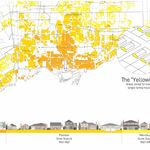A
AlvinofDiaspar
Guest
From the Star:
Simpler transit system closer
Legislation to be introduced today
GTTA to focus on commuter needs
Apr. 24, 2006. 01:00 AM
KEVIN MCGRAN
TRANSPORTATION REPORTER
The Greater Toronto Transportation Authority is at hand.
Transportation Minister Harinder Takhar is poised to introduce today long-awaited legislation to create a new regional body to simplify transit, ease congestion and curb sprawl, sources told the Star.
Toronto is expected to have four seats on an 11-member board that will oversee the implementation of a single farecard that streamline commuting between municipalities.
Hamilton as well as the regions of Peel, Durham, Halton and York will have seats on the board, which will also manage GO Transit and govern some regional roads.
An advisory body of commuters — including students, seniors and workers — will also help the board identify issues.
If the legislation passes quickly, the GTTA could be up and running by September.
A priority is to put the commuter's interest first, said one source. That means putting an end to the bickering and frustration over paying more than one farewhen passengers travel between municipalities. It would also end turf wars that leave empty buses from one area legally unable to pick up passengers in another.
"Right now, somebody standing on the side of the street in Mississauga sees a TTC bus going right by them the same way and they can't get on it," said a source. "It won't be Mississauga's responsibility, it won't be Toronto's responsibility. It's the GTTA's responsibility to co-ordinate that."
The farecard, a pilot project scheduled to begin in 2007, is one solution and will be a GTTA priority. Under a farecard system, a commuter's card is read automatically getting on — and off — a bus or a train, with the appropriate fare paid to the appropriate transit authority through a computer program.
The plan is to make a big splash today, with the mayors and regional chairs riding buses representing their municipalities today at the Metro Toronto Convention Centre.
Halton Region Chair Joyce Savoline is considered the front-runner for the job of GTTA chair. She announced she's not running for re-election. Former GO Transit chair Gordon Chong and outgoing Burlington Mayor Rob McIsaac are also rumoured to be in the running.
There was still concern over how Toronto and the TTC will deal with a new player.
"Now the GTTA is coming into constrain our authority in terms of our capital program. I can live with that, but it all depends on the authority it's going to have," said TTC chair Howard Moscoe.
AoD
Simpler transit system closer
Legislation to be introduced today
GTTA to focus on commuter needs
Apr. 24, 2006. 01:00 AM
KEVIN MCGRAN
TRANSPORTATION REPORTER
The Greater Toronto Transportation Authority is at hand.
Transportation Minister Harinder Takhar is poised to introduce today long-awaited legislation to create a new regional body to simplify transit, ease congestion and curb sprawl, sources told the Star.
Toronto is expected to have four seats on an 11-member board that will oversee the implementation of a single farecard that streamline commuting between municipalities.
Hamilton as well as the regions of Peel, Durham, Halton and York will have seats on the board, which will also manage GO Transit and govern some regional roads.
An advisory body of commuters — including students, seniors and workers — will also help the board identify issues.
If the legislation passes quickly, the GTTA could be up and running by September.
A priority is to put the commuter's interest first, said one source. That means putting an end to the bickering and frustration over paying more than one farewhen passengers travel between municipalities. It would also end turf wars that leave empty buses from one area legally unable to pick up passengers in another.
"Right now, somebody standing on the side of the street in Mississauga sees a TTC bus going right by them the same way and they can't get on it," said a source. "It won't be Mississauga's responsibility, it won't be Toronto's responsibility. It's the GTTA's responsibility to co-ordinate that."
The farecard, a pilot project scheduled to begin in 2007, is one solution and will be a GTTA priority. Under a farecard system, a commuter's card is read automatically getting on — and off — a bus or a train, with the appropriate fare paid to the appropriate transit authority through a computer program.
The plan is to make a big splash today, with the mayors and regional chairs riding buses representing their municipalities today at the Metro Toronto Convention Centre.
Halton Region Chair Joyce Savoline is considered the front-runner for the job of GTTA chair. She announced she's not running for re-election. Former GO Transit chair Gordon Chong and outgoing Burlington Mayor Rob McIsaac are also rumoured to be in the running.
There was still concern over how Toronto and the TTC will deal with a new player.
"Now the GTTA is coming into constrain our authority in terms of our capital program. I can live with that, but it all depends on the authority it's going to have," said TTC chair Howard Moscoe.
AoD




